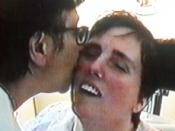Garbaccio 8
Ashley Garbaccio
Professor Okster
Philosophy 1051-MV1
November 18, 2010
Descartes' View of Personhood: A philosophical analysis of Terri Schiavo and her state of being
I will argue that philosopher Rene Descartes provides us with imperative arguments as to why an individual who is not capable of conscious thinking is not a person. The most influential present-day circumstance correlated to Descartes' view of personhood is that of Terri Schiavo, an American woman diagnosed as being in a persistent vegetative state following a severe heart attack. This case is convincingly related to Descartes' most famous sentence of his philosophy, "cogito ergo sum": I think therefore I am. These issues will demonstrate that there are two separate criteria Descartes considers when judging the mental being of an individual. I will use the example of Terri Schiavo to conclude that to be a human you must have the capacity to think and because Terri Schiavo was not conscious, she is not a person.
In one of the most compelling court cases captivating the United States from 1998 to 2005, Terri Schiavo was diagnosed with persistent vegetation following a two-month comatose state. According to the Journal of Clinical Investigation, patients in a persistent vegetative state, "demonstrate no signs of conscious behavior" and especially in Schiavo's condition, no expectation of recovery (Hirsch). As I will explain in the following thesis, personhood depends greatly on consciousness. I will illustrate how Terri Schiavo could not be classified as a person through Descartes' division of reality into the mental and physical realms as well as his thoughts on how consciousness affects the state of being.
First, it must be determined that Terri Schiavo is no longer the same person that she was before her heart attack. There are clearly significant changes in her being since the accident...


